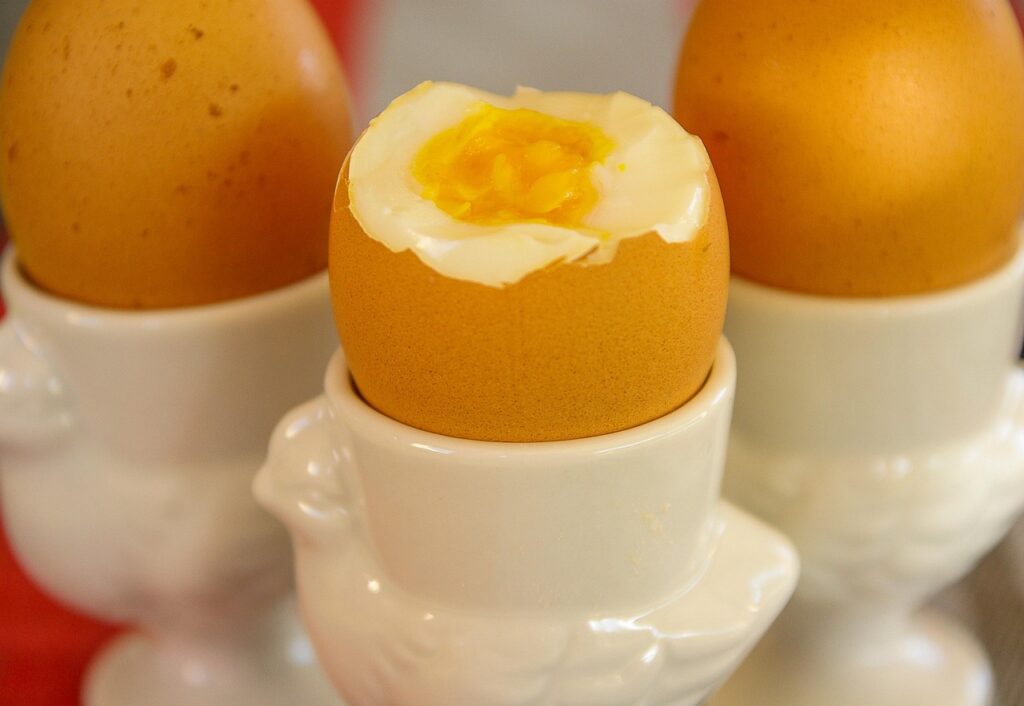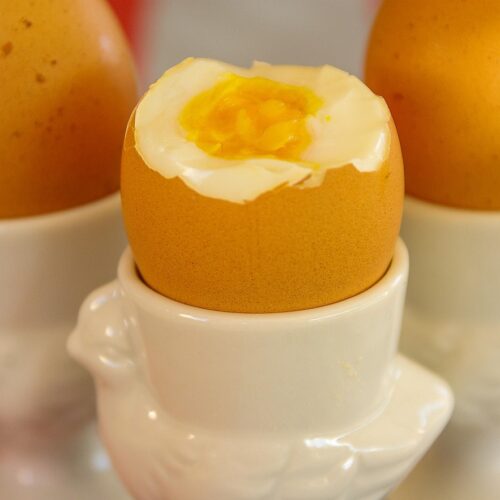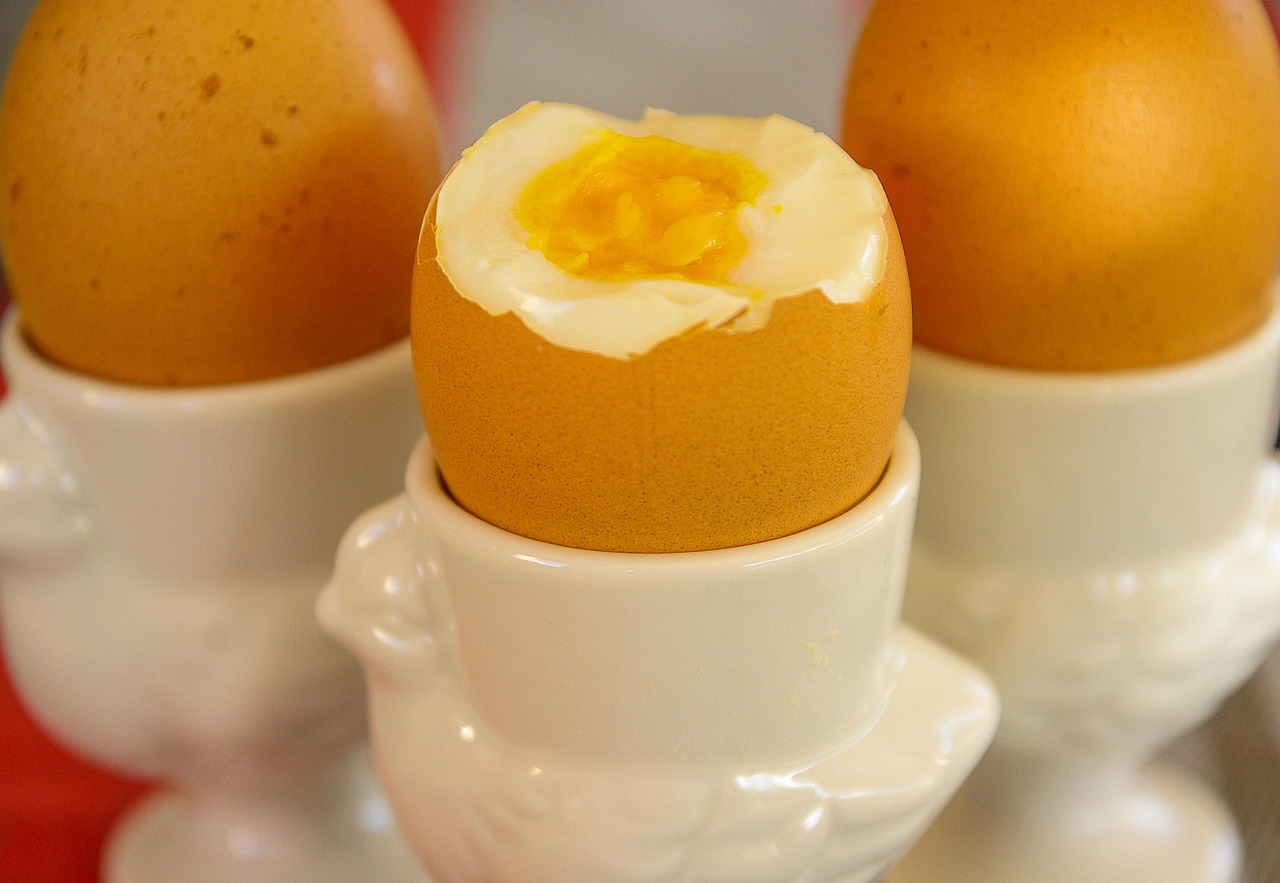Learn how to make perfect boiled eggs with this simple guide. Discover cooking tips, health benefits, and FAQs for soft, medium, or hard-boiled eggs.

Ratings 05

What Is The Boiled Eggs
01. What Are Boiled Eggs?
There are two main types:
- Soft-boiled eggs: The yolk remains runny or slightly set, while the white is fully cooked.
- Hard-boiled eggs: Both the yolk and the white are fully cooked and firm.
Health Benefits Of Boiled Eggs
Boiled eggs are a nutrient-dense food offering many health benefits:
01. High-Quality Protein
- Each boiled egg provides about 6–7 grams of complete protein.
- Supports muscle repair, growth, and overall body function.
02. Rich In Vitamins
Excellent source of:
- Vitamin B12 (supports nerves and red blood cells)
- Vitamin D (supports bones and immunity)
- Vitamin A (good for vision and skin)
- B2 (Riboflavin) (helps energy metabolism)
03. Good For Eye Health
- includes the antioxidants lutein and zeaxanthin, which also lower the risk of cataracts and macular degeneration, respectively.
04. Promotes Brain Health
- Rich in choline, essential for brain development and function, especially important during pregnancy.
05. Weight Management
- Low in calories (~70–80 calories per egg)
- High in protein = helps with satiety (feeling full), which may aid weight control.
06. Heart Health
- Boiled eggs contain healthy fats, and recent studies show that moderate egg consumption does not significantly increase heart disease risk for most people.
07. Supports Healthy Pregnancy
- Nutrients like folate, choline, and B vitamins support fetal development and reduce neural tube defect risks.
Tips For Making Boiled Eggs
Boiling eggs may seem simple, but a few smart techniques can make a big difference in texture, taste, and ease of peeling.
01. Use A Timer
Time precisely depending on your preference:
- Soft-boiled: 6–7 minutes
- Medium-boiled: 8–10 minutes
- Hard-boiled: 11–12 minutes
02. Start With Cold Water
- Bring cold water to a boil and insert the eggs. This helps to keep them from trying to break and guarantees that those who cook through.
03. Add Salt Or Vinegar (Optional)
- Salt can help prevent cracking.
- Vinegar can help if the shell cracks—it keeps the white from oozing out and may make peeling easier.
04. Use An Ice Bath
- Transfer eggs to ice water immediately after boiling. This stops cooking, prevents green yolk rings, and makes peeling easier.
05. Use Slightly Older Eggs
- Eggs that are 5–10 days old peel more easily than very fresh ones.
06. Roll To Crack, Then Peel Under Water
- Gently roll and tap the egg to tear the shell.
- Peel in a bowl of water or under running water to help grab and let go of hard parts.
07. Store Properly
- Store unpeeled boiled eggs in the fridge for up to 1 week.
- If peeled, keep them in an airtight container with a damp paper towel to keep them moist.
FAQ Boiled Eggs
Here are some frequently asked questions about boiled eggs:
01. How Long Should I Boil Eggs?
- Soft-boiled: 6–7 minutes
- Medium-boiled: 8–10 minutes
- Hard-boiled: 11–12 minutes
02. Why Do My Eggs Crack While Boiling?
Cracking usually happens due to temperature shock. To prevent this:
- Start with cold water
- Add a pinch of salt or vinegar
- Use room-temperature eggs if possible
03. Why Do Egg Yolks Turn Green?
A green ring around the yolk is caused by overcooking or not cooling the eggs fast enough. To prevent this, take an ice bath immediately after boiling.
04. Can I Boil Eggs Without Them Exploding?
Similarly. Avoid packing the pot too full, start with cold water, and don’t bring it to a boil too quickly.
05. How Do I Make Eggs Easier To Peel?
- Use older eggs (5–10 days old)
- Cool eggs in ice water after boiling
- Peel in a bowl of water or under running water.
06. How Long Do Boiled Eggs Last?
- Unpeeled: Up to 1 week in the fridge
- Peeled: 3–5 days in a sealed container
07. Can I Reheat Boiled Eggs?
Yes, but avoid microwaving (they can explode). Instead:
- Place in hot water for a few minutes
- Or slice and warm gently in a pan
08. Are Boiled Eggs Healthy?
Yes! They’re packed with protein, vitamins, minerals, and healthy fats—great for weight management and overall nutrition.

Boiled Eggs
Ingredients
- Eggs (as many as desired)
- Water
- Salt (optional – helps prevent cracking)
- Ice or cold water (for cooling)
Instructions
Prepare The Eggs
- Place eggs in a single layer in a saucepan.
Add Water
- Fill the pot with enough cold water to cover the eggs by about 1 inch.
Boil
- Place the saucepan over medium-high heat.
- Once the water reaches a rolling boil, cover the pot with a lid and turn off the heat (for electric stove) or reduce to low (for gas).
Set A Timer
- Depending on how you like your eggs:
- Soft-boiled: 6–7 minutes
- Medium-boiled: 9–10 minutes
- Hard-boiled: 11–12 minutes
Cool The Eggs
- Immediately transfer eggs to a bowl of ice water or run under cold water for a few minutes.
- Let sit for at least 5 minutes to make peeling easier.
Peel And Serve
- Gently tap and roll the eggs to crack the shell.
- Peel under running water if needed.
-
Boiled Eggs
Learn how to make perfect boiled eggs with this simple guide. Discover cooking tips, health benefits, and FAQs for soft, medium, or hard-boiled eggs. Ratings 05 What Is The Boiled Eggs 01. What Are Boiled Eggs? There are two main types: Health Benefits Of Boiled Eggs Boiled eggs are a nutrient-dense food offering many health…


Leave a Comment